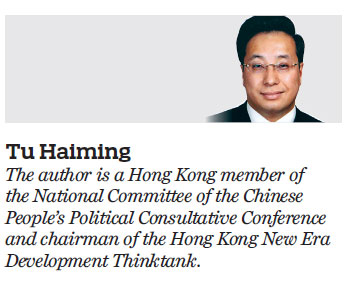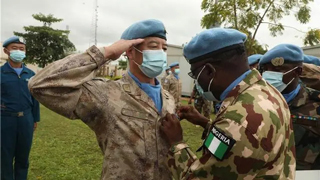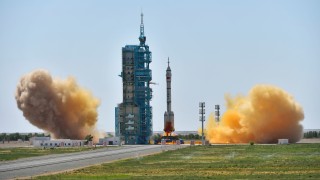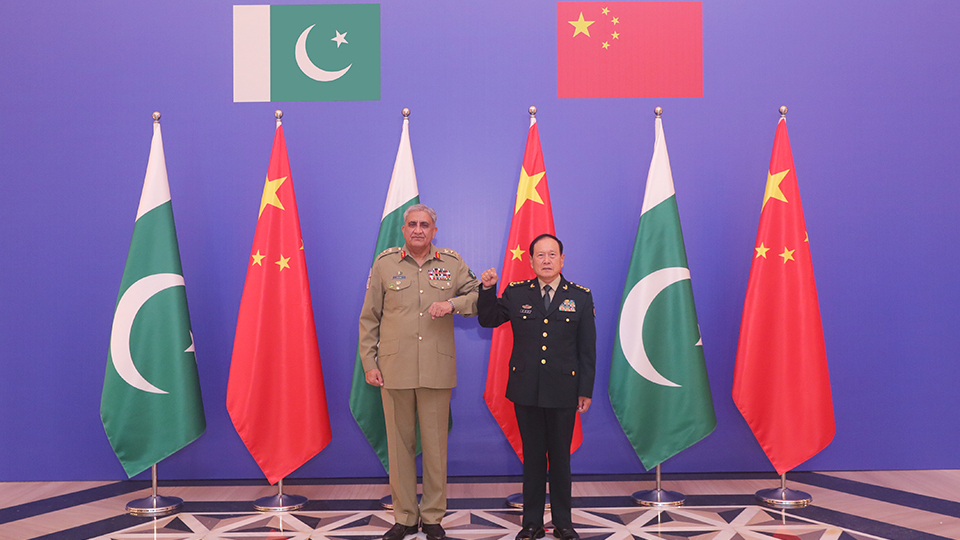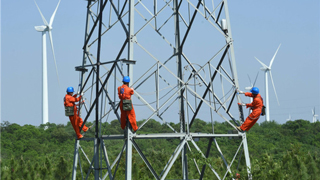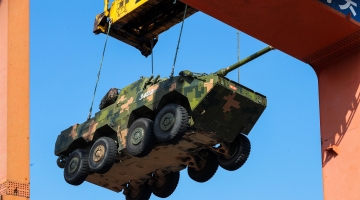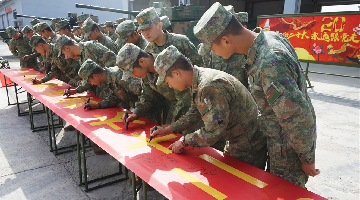Tu Haiming says blueprint for nation's development to be adopted by Party Congress upholds this principle
Amid the profound changes unseen in a century in the global political landscape, the 20th National Congress of the Communist Party of China answers the major questions concerning China's future development path. It has naturally attracted huge global attention. For the world audience, the policy direction of the world's second-largest economy and a major engine for global economic growth is simply too important to overlook.
Since the 18th Party Congress, the CPC has, out of its own sense of responsibility, contributed not only to the well-being of the Chinese people but also the peaceful development of the world. This sense of responsibility is in line with the concept of "building a community with a shared future for mankind" that President Xi Jinping has been advocating.
What China has been doing is in stark contrast with the "America First" policy proposed by then-US presidential candidate Donald Trump, as well as the flawed sense of superiority of some Western politicians who pay little regard to other countries' well-being other than their own. This rather egoistic and myopic concept of development has consequently resulted in an imbalanced international order that gives rise to escalating conflicts.
When General Secretary Xi Jinping met with the foreign press after assuming the top post of the CPC Central Committee, he noted that the international community was increasingly interdependent on each other, and no country could tackle the complex economic situation and global issues on its own. He then brought up the concept of "building a community with a shared future for mankind", urging world leaders to take into account the legitimate concerns of other countries when pursuing their own national interests, and to seek collaborative development opportunities with other countries when advancing their own national development endeavors. The ideal of "building a community with a shared future for mankind" later on was written into the constitutions of the CPC and the People's Republic of China. This speaks volumes about the CPC's firm commitment to not only the well-being of Chinese people but people around the globe.
The concept of "a community with a shared future for mankind" has gradually gained traction, and more and more countries are approaching China for partnership and collaboration. Since the 18th Party Congress, nine countries have established or resumed diplomatic relations with China, raising the total number of countries with diplomatic relations to 181. China has also become the largest trading partner of more than 120 countries, forging mutually beneficial relations along the way.
'China model' contributes to
overall well-being of humanity
As the world stepped into 2022, especially after the outbreak of the military conflict between Russia and Ukraine, a major landmark in global geopolitical rivalry, more and more countries took sides, willingly or otherwise. The world is now in peril of falling apart, with economic decoupling, hot war, food crises, and energy shortages casting a gloom over the future of humanity.
The profound changes unseen in a century, as General Secretary Xi Jinping predicted, are rolling out in full force in the international arena, giving rise to the question about the future of humanity. Xi has a well-thought-out plan for China's future path and has reminded CPC cadres to think about national development from two perspectives: a global perspective that takes into consideration all those profound changes, and a national perspective that focuses on the overall direction of the great rejuvenation of the Chinese nation. These strategic perspectives have underpinned China's advocacy of instituting an open global economy, ensuring the security and stability of global industrial chains and supply chains, promoting a new form of global governance that prioritizes consultation, contribution and mutual benefits, and upholding a new vision of common, comprehensive, cooperative and sustainable security for all countries, as well as its objection to fragmentation of the global market, politicization of international cooperation mechanisms, and weaponization of rules and standards.
The "China solutions" were widely discussed among nations in a slew of major diplomatic occasions, such as the Asia-Pacific Economic Cooperation (APEC) Economic Leaders' Meeting in Beijing, the G20 Hangzhou Summit, the Shanghai Cooperation Organization Summit, the BRICS Summit, the Belt and Road Forum for International Cooperation, the Forum on China-Africa Cooperation Summit, the Boao Forum for Asia, the Conference on Dialogue of Asian Civilizations, CPC and World Political Parties Summit, etc. China is also broadly commended for its dedication to resolving international and regional hot issues, participating in climate-change governance, strengthening global public health governance, establishing the Asian Infrastructure Investment Bank and the New Development Bank, and proposing global development initiatives and global security initiatives.
As the course of global development becomes increasingly unpredictable, China has offered a sense of stability with its pragmatic and forward-looking propositions.
China has been recognized for its valuable contributions in the global fight against the COVID-19 pandemic. It has rolled out a number of measures to increase the availability of vaccines for the international community, such as the Global Vaccine Cooperation Action Initiative, the Initiative for Belt and Road Partnership on COVID-19 Vaccines Cooperation, establishing the BRICS Vaccine Research and Development Center, working with relevant institutions to conduct vaccine clinical trials in more than 20 countries, and joining hands with 16 countries in the production of vaccines. China has, moreover, donated a copious amount of anti-pandemic resources to many pandemic-stricken regions around the world to curb the spread of the virus.
Meanwhile, politicians and media in the United States and some other Western countries have resorted to peddling untruths about the source of the coronavirus from the outset or even called for a coalition to demand "indemnity" from China for the outbreak of the COVID-19 pandemic. Once vaccines were developed, the US decided to hoard multiple times more vaccines than was needed without paying attention to the miseries of other countries, and thus was accused of practicing "vaccine nationalism" that runs counter to its responsibility to the world as a global superpower.
China's global anti-pandemic initiatives make up only a small part of its contribution to the world. The Belt and Road Initiative has brought huge benefits to participating countries. In the past nine years, China has invested a total of $43 billion in 24 Belt and Road countries, creating approximately 346,000 jobs for their citizens. Over the years, China has offered free aid to African countries and South Pacific island countries in assisting them to build mega infrastructure projects such as roads, bridges and ports that have greatly enhanced the well-being of the locals. The malicious campaign launched by a few Western countries against the Belt and Road Initiative has failed to withstand scrutiny in front of the widespread recognition of China's contributions.
The CPC has dutifully discharged its responsibility toward the Chinese people; and China has played an increasingly significant role in international affairs, contributing tremendously to the overall well-being of humanity. General Secretary Xi has pointed out that the CPC is a political party dedicated to seeking happiness for the Chinese people as well as striving for the progress of human civilization. The blueprint for China's future socioeconomic development to be adopted by the 20th Party Congress once again upholds this tenet, which also provides a brighter prospect for the practice of "one country, two systems" in Hong Kong.
The views do not necessarily reflect those of China Daily.
